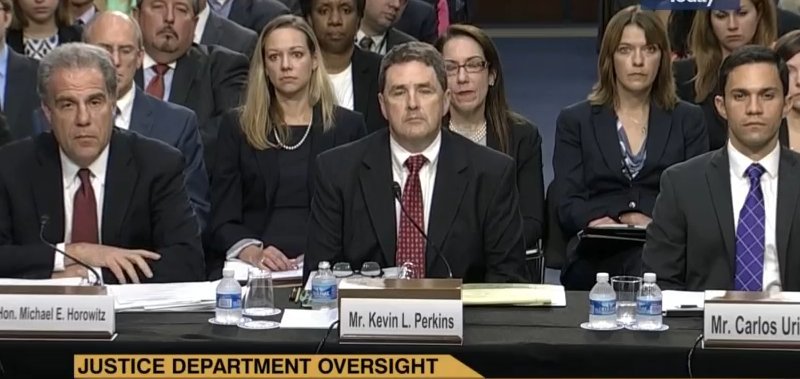-

NYPD refuses to release shooting reports the court already ruled are public
The NYPD recently rejected a request for factual reports that officers must file after any shooting incident. It’s an odd response, given that no less an authority than the state Supreme Court ruled in 2011 that these same reports are indisputably public.
-

10 years later, “lessons” of Hurricane Katrina still resonate
Tomorrow marks the 10th anniversary of Hurricane Katrina’s landfall in the gulf. Numerous news outlets, and a few federal agencies - most notably FEMA - have taken the opportunity to reflect on the storm and the nation’s response to it, benefiting from a decade of perspective. However, comparatively little attention has been paid to those reports created in the immediate aftermath, when the experience was fresher - and more painful - in people’s minds.
-

FBI ordered more cell phone trackers in wake of Hurricane Katrina
Hurricane Katrina killed hundreds of people along the Gulf Coast, displaced thousands more, and exposed critical deficiencies in our country’s disaster response mechanisms. The historic storm also revealed gaps in the FBI’s inventory of cell phone trackers, making additional equipment purchases “essential,” by the agency’s assessment.
-

“It is sensationalized cruelty” Game of Thrones FCC Complaints
The award winning HBO series Game of Thrones, based on George R.R. Martin’s fantasy novels, has a reputation for eliciting outrage from nearly everyone who encounters it. But, while a large subset of the television-viewing population has a problem with GoT, there are few among us who would brazenly seek retribution by way of the FCC.
-

FBI struggles to recruit private sector partners on cybersecurity
Even as hacks like the tawdry Ashley Madison affair demonstrate how vulnerable cyber infrastructure can be to attack, the FBI is finding it difficult to convince companies to share details of security breaches. An audit report released last month by the Justice Department’s inspector general found that the private sector lacks confidence that the FBI will strike the appropriate balance between national security and customer privacy.
-

FBI informant warned Bureau that Ray Bradbury’s sci-fi was part of a commie plot to sap American resolve
Science fiction - a commie plot to undermine American values? It’s an idea that the FBI was strongly considering during the height of the Cold War, as its lengthy investigation into acclaimed author Ray Bradbury shows.
-

Texas police’s big military gear comes with little training
It’s a reasonable expectation that if the Pentagon’s giving out 24-ton military vehicles, those departments should be sufficiently trained in how to use it. But as the wide discrepancy in quality shown by docs released by the Texas Department of Public Safety shows, that’s not always be the case.
-

We’re better at tracking the deaths of bees than people who die in police custody
Every year, a certain number of bees die. And every year, a certain number of people die while in police custody. We have a solid figure for one of these death tolls. At present, it’s not the human body count.
-

“The line needs to be drawn SOMEWHERE” The Office FCC complaints
MuckRock’s Tom Nash recently obtained FCC complaints regarding NBC’s office, spanning the show’s last two seasons. While the nature of these complaints is nothing new - almost entirely concerning being reminded of the existence of genitals - there is a refreshing eloquence to them that sets them apart for your run-of-the-mill cries for censorship.
-

FOIL’d: The pursuit of open records in New York
The New York World and MuckRock filed 344 open records requests to 86 local and state agencies subject to New York state’s Freedom of Information Law (FOIL) as part of an effort to assess how effectively different agencies deal with such requests. The results were decidedly mixed, as some agencies quickly provided the requested documents in an easy-to-use format and at no cost, while other requests remain outstanding to this day, eight months after they were filed.
-

Texas doesn’t mince words on solitary confinement
For a term as familiar as “solitary confinement,” the official record is impressively adept at calling the practice just about anything else. In Texas, though, the phrase is used and the practice utilized - a lot.
-

Once, twice, three times an agency: The ATF’s identity crisis
You may have heard that the Bureau of Alcohol, Tobacco, Firearms and Explosives has an identity crisis, at least when it comes to being sued. Federal lawyers claim that the ATF is not, in fact, an “agency”, but rather a “component” of the Department of Justice.
-

George Carlin’s J. Edgar Hoover impression got him put on the FBI’s watchlist
Documents from the FBI reveal that J. Edgar Hoover took personal offense to comedian George Carlin following his appearances on “The Carol Burnett Show” and “Jackie Gleason.”
-

Vermont is outsourcing its inmates to private prisons in Michigan
A crime is committed in a state. The suspect’s tried, convicted, and sentenced there, and there’s a general expectation that then the punishment will play out close to home — unless it happens that one lives in a state like Vermont, with a correctional system so overcrowded that some prisoners must be shipped away to a facility somewhere else.
-

Justice Department Inspector General fighting for access to federal documents
An effective audit should be a strip search, not a cautious patdown. But federal agencies — including the FBI and other law enforcement groups — have begun to argue that they have the legal authority to declare certain records off-limits, even to inspectors general charged with detecting waste, fraud and abuse.
-

“NOT FOR KIDS. NOT FOR CHILDREN. THIS IS SICK” Adult Swim FCC complaints
In response to a request by user Will Green, the FCC released the last three years of complaints regarding the “Adult Swim” cable network. Hot topics for controversy included blasphemy and brown paper bags.
-

Checkup time for Corizon, America’s prison medical contractor
Corizon Health provides inmate healthcare to facilities around the country, taking the mess of medical treatment off of state and local agencies. But increasingly, these governments are finding that maintaining quality care under contract is complicated and burdensome. Might yours be one of them?
-

Massachusetts Municipal Association vs. the People
While the people of Massachusetts look toward public records reform, the cities and towns that represent them are fighting back against access.
-

Army contractor let drones go missing in Afghanistan for 8 months
An Army contractor lost track of at least four surveillance drone systems during the Afghanistan drawdown, a recent audit report uncovered. Sloppy paperwork allowed the drones, worth $500k apiece, to fall through bureaucratic cracks.
-

Street Level Surveillance: Help find who uses mobile biometric technology
Police departments are increasingly tracking your face, your fingerprints, your tattoos — and even your DNA. Help the Electronic Frontier Foundation and MuckRock uncover how local agencies are tracking you and bring some much-needed transparency to the murky world of biometric surveillance.
-

Wherever IWW leader and ACLU co-founder Elizabeth Gurley Flynn went, the feds followed
Files released by the Federal Bureau of Investigation reveal that early twentieth century activist and co-founder of the American Civil Liberties Union, Elizabeth Gurley Flynn predictably spent at least 1921 to 1924 under surveillance by undercover agents. The documents specifically focus on a speaking tour Flynn launched after the July 1921 conviction of Italian anarchists Nicola Sacco and Bartolomeo Vanzetti for murder.